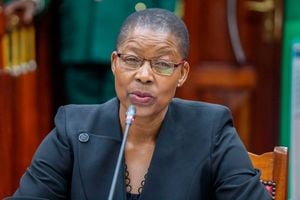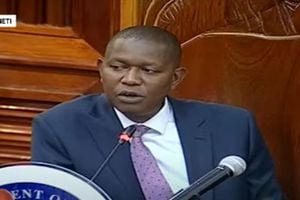Security guards get peanuts yet they protect billions, lobby says

Professional Association of Licensed Private Security Services Providers of Kenya CEO and Chairman Henry Carlos Kioko during an interview at Nation Centre, Nairobi on December 16, 2023.
A lobby has decried the low wages paid to private security guards in the country.
The Professional Association of Licensed Private Security Services Providers of Kenya (PALSAK) said guards man multi-billion-shillings institutions round the clock, yet they are contracted at an average pay of Sh15,000 per month.
In Kenya, private security guards man multi-billion shilling institutions around the clock, yet they are contracted for an average of Sh15,000 a month. There is no justice because industry players have not come together to insist that security is not cheap, says Henry Carlos Kioko, the chairperson and chief executive of the Professional Association of Licensed Private Security Services Providers of Kenya (PALSAK), the umbrella body that promotes the professional development and welfare of private security guards in Kenya.
"Private security firms market security as a cheap service by underbidding to win contracts with companies," he notes. "This is done against the welfare of individual guards, as the owners of private security companies are only mindful of their bottom line."
Since I started working in the security industry 25 years ago, guards have remained on the same salary, he notes.
He adds: "Yet the cost of living, including house rent, transport, clothing, food, education and medical care, has increased. Security companies are also making more money.
Last month, the government, through the Private Security Regulatory Authority (PSRA), published a gazette notice requiring security companies to pay their workers a minimum of Sh30,000 gross per month, which PALSAK says will make the industry more professional and increase profitability.
"Most players are asking how we are going to pay a security guard Sh30,000 when the client cannot pay between Sh40,000 and Sh50,000. This is not something that can be negotiated. Security should not be a cheap business. A security guard has to be paid professionally and it should not be a question of the cost of doing business.
Private security industry
Security is one of the government's top priorities. "If we have a weak private security industry - if we underpay our guards - their professional development is not taken into account. That weakens the security of this nation. This is something we have always wanted the Interior Cabinet Secretary, Prof Kithure Kindiki, to understand so that he prioritises the development of the private security industry".
PALSAK supports the professional development of the industry and we believe that the regulations introduced by the PSRA are the beginning of the growth and profitability of the industry, says Mr Kioko.
In Nairobi and many other urban areas in Kenya, security guards live in informal settlements and typically walk long distances to their places of work. By the time they report on duty, they are tired and their alertness is low.
"For a security guard to be able to prevent crime, he must have enough rest and be alert. The security of clients and citizens will be compromised if the well-being of the guards is not guaranteed".
PALSAK, says Kioko, is working with the government to ensure that the industry complies with the authority's requirements and that training for security guards is easily accessible and affordable.
Currently, the basic course offered by PRSA-licensed institutions costs an average of Sh18,000, which is the basic salary of a security guard. This raises the question of how Kenya intends to improve the professionalism of its guards.
It is estimated that there are about one million security guards working for over 2,000 security companies in Kenya. PALSAK has partnered with US institutions, Maryland University and Defencify Training, and DisasterReady, an institution in France, to provide free online certificate training programmes for security guards.
"This will give our guards the skills to manage assignments well and to work with human resource personnel to address security issues within organisations. They will also gain counter-terrorism skills to detect and prevent crime.
Public security
As the private security industry becomes more professional, it means that the police will be withdrawn from the private companies and they will focus on their work - public security, says the ex-police officer.
"We should not see the police escorting vehicles transporting cash or guarding institutions. All that should go to the private security industry."
Following the PRSA directive, some of the security firms ganged up and secretly met the Parliamentary Committee on Security, Mr Kioko revealed.
"What happened there remains unknown as they never made their statement public," he told Nation. Africa.
PALSAK's registration was approved after eight months, instead of the 120 days it normally takes for an association to receive a certificate, and is awaiting verification.
The body is appealing to the Attorney General's office to issue the association with a certificate so that it can open up the industry to more opportunities.
Mr Kioko, the founder of PALSAK, has been in the private security industry for over 25 years. He spent nine years in the Kenya Police Service before retiring to join the corporate sector where he has held senior management positions with leading security companies such as G4S, Security Group Africa (SGA), Senaca and HIPORA.





